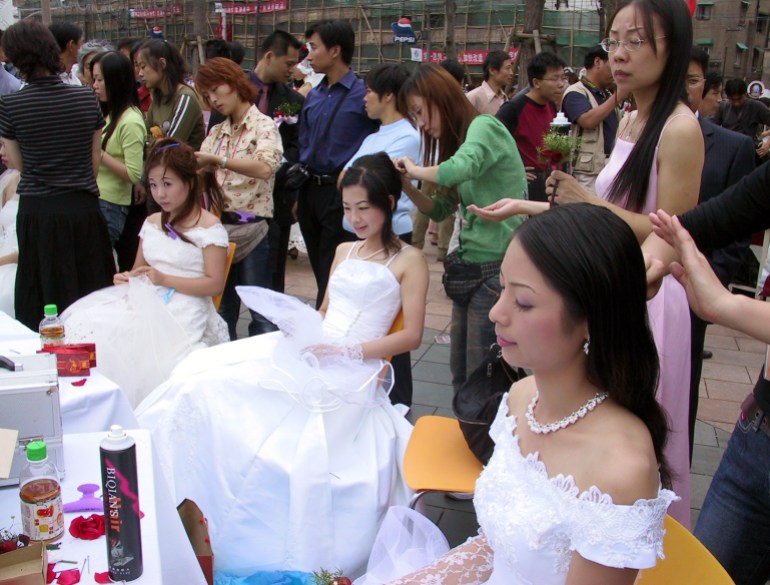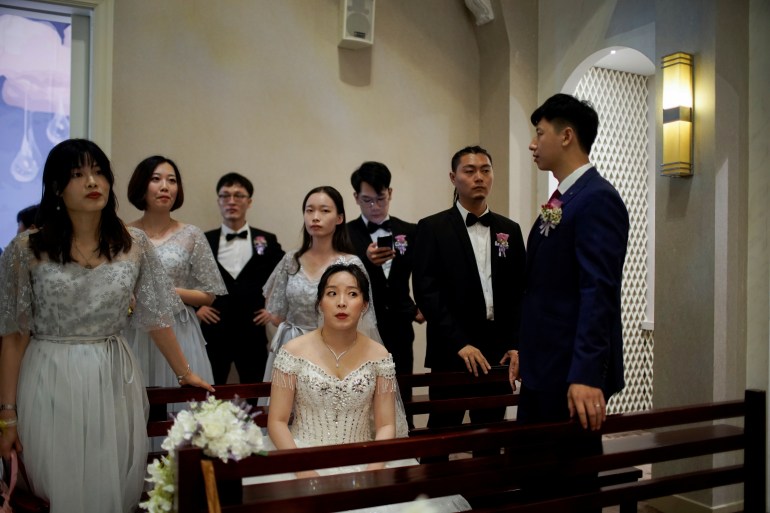China’s equivalent of Valentine’s Day, known as the Qixi Festival, has traditionally been considered an auspicious time for Chinese couples to get married.
Celebrated annually on the seventh day of the seventh month in the Chinese lunar calendar, Qixi is a celebration of romantic love between the star-crossed lovers Zhinu and Niulang in Chinese mythology.
Aiming for a romantic display on a romantic day, a marriage registration office in the city of Mianyang in Sichuan Province decided to livestream the marriage registration ceremonies during this year’s festival which fell on August 22.
There was just one problem. Very few couples turned up to get married, according to those watching.
The livestream was eventually interrupted.
Instead of a largely empty marriage registration hall, the online audience was offered picturesque views of Mianyang city.
Local city authorities later denied reports that hardly any marriages were registered on the special day.
By then it was too late.

The empty marriage registration hall in Mianyang had become a trending topic on China’s social media platforms and a symbol of China’s declining marriage rates.
Officials figures show that marriage rates are plummeting in China despite government policies to promote couples marrying and Chinese society’s traditional expectations regarding matrimony.
The number of people getting married fell from approximately 13.5 million couples annually in 2013 to approximately 6.8 million last year.
Figures indicate that people in China are also getting married later, divorce rates are rising, and the number of people choosing to remain single is growing.
Young Chinese people say they find marriage to be incompatible with their modern lives.
“Marriage is kind of dying in China,” 26-year-old Yu Zhang from Shanghai told Al Jazeera.
Zhang, a laboratory technician, has been together with his girlfriend for two years and they have often talked about marriage, but they always arrive at the same conclusion: “The thought of getting married makes us more stressed than happy.”

They associate marriage with the union of two families as well as buying a home and starting a family.
And, right now, those three goals seem unrealistic.
“My mom and her parents don’t like each other, the property market is not good and it is too expensive to have a child,” Zhang explained.
And, since China’s COVID-19 restrictions were lifted, Zhang and his girlfriend have enjoyed eating out at their favourite restaurants and taking short trips around China.
“If we had to start paying for a house and have children, we would not have the time or the money for such things any more,” he said.
Zhang and his girlfriend are the couples that local and national Chinese authorities have been trying to persuade to tie the knot but without much success.

‘I choose not to get married’
Pilot projects with the aim of promoting marriage were announced in May in more than 20 Chinese cities.
A county in China’s Zhejiang Province announced last month that it would start to offer monetary rewards for newlyweds if the bride was 25 or younger. Officials have also publicly encouraged people to get married and have children at the “right age”.
Chinese popular culture has been mobilised too. Recent TV shows and fashion styles have centred around the importance of being married.
Jessica Fu from Guangzhou City believes that the attention given to marriage is connected to the government’s goal of boosting the country’s birthrate.
“Having children mostly happens within marriage in Chinese society,” the 31-year-old marketing coordinator told Al Jazeera.
China’s birthrate has fallen in tandem with the plummeting marriage rate, a dynamic that has set the stage for a demographic crisis in China if the trend is not reversed in the near future.
But the current emphasis on the husband-and-wife bond, government incentives to wed, and pop culture trends promoting married bliss have not convinced Fu.
“I don’t like what marriage does to people in China,” she said.

Fu told how her parents have been unhappily married for as long as she can remember, but they stayed together because they considered divorce to be shameful.
“And then my cousin got married recently, and she is under a lot of pressure from her husband and in-laws to abandon her career and be a traditional Chinese woman,” she said.
Fu added that one day she would like a partner with whom she can share her life.
“But I choose not to get married,” she added.
China’s ‘singles’ economy’
The advent of personal choice has changed the marriage dynamic in Chinese society, according to Pan Wang, a senior lecturer in Chinese and Asian Studies at Australia’s University of New South Wales.
“Married life is just one of many lifestyle options today,” Wang, who is the author of the book Love and Marriage in Globalizing China, told Al Jazeera.
There is now an entire “singles’ economy” in China that offers everything from home and household appliance purchases to culinary experiences, and from entertainment for singles to solo traveller packages, all tailored exclusively to individuals, Wang said.
Previously in China, choosing to stay unmarried was not really an option for some.
Many marriages were arranged by parents and families, while it was also not uncommon for community elders, workplace managers or institutions to be involved in matchmaking.
“For earlier generations, love and marriage was a collective affair rather than a personal choice,” Wang said.

But the increased focus on education for both men and women in the 1990s as China liberalised and modernised, coupled with unprecedented economic growth, transformed Chinese society drastically.
Traditional communities fragmented as tens of millions of men and women migrated to the expanding cities for work.
China’s one-child policy – in place from 1980 to 2015 – pushed families with a traditional preference for boys to, nonetheless, focus their attention, aspirations and resources on their only child – and for many that was a girl.
In this rapidly changing Chinese society, a new generation of women grew up who were determined to use their educational attainment to enter the Chinese economy and compete for opportunities and resources.
Chinese women carved out new spaces for themselves in society and attained a level of financial security that most women in earlier generations could only achieve through marriage.
“Marriage used to be the centrepiece of life but now it no longer has to be,” Mu Zheng, an assistant professor at the National University of Singapore, told Al Jazeera.
Focused on researching marriage and family behaviour in contemporary China, Zheng said that while government policies and economic growth changed the economic circumstances and life choices available to men and women, China’s cultural norms have not changed as quickly.
Both men and women are still expected to work hard outside the family structure while within those structures gender roles persist, which means that women are expected to be good mothers and good wives while men are still seen as the primary breadwinners.
Those expectations feel confining to young people nowadays, according to Zheng, while gender roles can make some women and men reluctant to get married.

‘Better to not get married at all’
Yuan Xu from Shenzhen thinks that Chinese society’s expectations of young people are unrealistic.
The 25-year-old lost her job at a Chinese tech company during the COVID-19 pandemic and she now works longer hours and gets paid less for managing the social media accounts of a local restaurant chain.
“The economy is really bad right now for young Chinese people,” she told Al Jazeera.
“When I lost my job, I took whatever I could find,” Xu said, describing how she only gets one day off a week and her salary is too low for her to put much money aside to save.
Youth unemployment in China reached a record high of 21.3 percent in June, according to government figures, a grim milestone that prompted the authorities to cease releasing data on the unemployed.
“When I hear from family and government people that I should keep in mind to marry at the right age and become a good wife and a good daughter-in-law, I get very stressed,” she said.
“I can’t do it all,” she added.
Xu is convinced that societal pressure compounded by traditional expectations not only turns young people away from marriage but also risks making marriages dysfunctional.
The darker side of marriage has come to the fore in China recently, vividly highlighted this year in a series of brutal domestic violence incidents that garnered much public attention.
Some of the cases involved women who were severely injured or even killed by their husbands because they were applying for, or planning to apply for, a divorce.
Horror at Home: China’s Domestic Violence Crisis
Alongside the plummeting number of marriages, divorce rates have been rising in China over the last decade despite Chinese authorities’ tendency to reject many of the petitions for divorce they receive.
Hoping to avert impulsive divorces, China’s government in 2021 introduced a mandatory 30-day “cooling off” period for couples seeking a divorce.
Xu described the government’s 30-day policy as a desperate attempt to force couples to stay together.
“And it is another reason why it is perhaps better to not get married at all,” she added.
Diverse dating
The dating scene is much more diverse in China today than it ever was, and people date for many different reasons other than to find a marriage partner, said Zheng, the researcher at the University of Singapore.
Dating can start offline or online, through friends, shared contacts, social media, dating apps or matchmaking platforms.
“Dating has also become a much more self-initiated and autonomous activity,” she said.
Xu said she had recently prioritised gaining new experiences in her dating and romantic life rather than hunting for a potential husband.
“Ever since the [COVID] lockdowns ended, I have mostly dated to meet new people that have hobbies and interests very different from mine,” she told Al Jazeera.

Jessica Fu from Guangzhou also told Al Jazeera how she had changed her approach to dating by taking the focus off the pressure, which she had felt from her parents and relatives, to find a marriage mate.
“I tried to tell myself that I wasn’t in a hurry to get into a relationship and that dates were about me enjoying my time in another person’s company,” Fu said.
“It was a way to remove the marriage stress I had started to connect with dating,” she added.
Fu is currently taking a break from the dating scene, however.
“I don’t have the time or the energy for it,” she said.
“And I am enjoying my single life at the moment.”
Sumber: www.aljazeera.com
 Skip to content
Skip to content

